Publications > Capgemini Consulting > Third-Party Logistics Study > Talent Management

Talent Management
Overcoming the Talent Shortage
A critical shortage going on in the logistics industry today has nothing to do with inventory; it’s the shortage of well-rounded supply chain managers prepared to step into key management positions. According to research by employment services provider Manpower Group, in the US, 52% of employers are experiencing difficulty filling supply chain positions within their organizations, up from 14% in 2010.
For many companies, the supply chain has become a significant contributor to attaining strategic business goals, making well-qualified logistics talent essential. As seen in Figure 19, shippers and 3PLs agree that having the right people and leadership in place is the number one driver of their companies’ success in the next five years, slightly outranking the importance of the right strategy and roadmap itself. 3PLs and shippers are aligned on all of the top drivers to organizational success.
Fortunately, the talent gap can be reduced. Shippers, 3PLs and other organizations active in the supply chain community have the opportunity to both develop and attract the next generation of managers with the diverse skills required to govern ever-more-complex supply chains. They can get there by investing in talent management, leadership skills and succession planning, as well as by defining the skill sets and capabilities these leaders will require and ensuring a satisfying work environment.
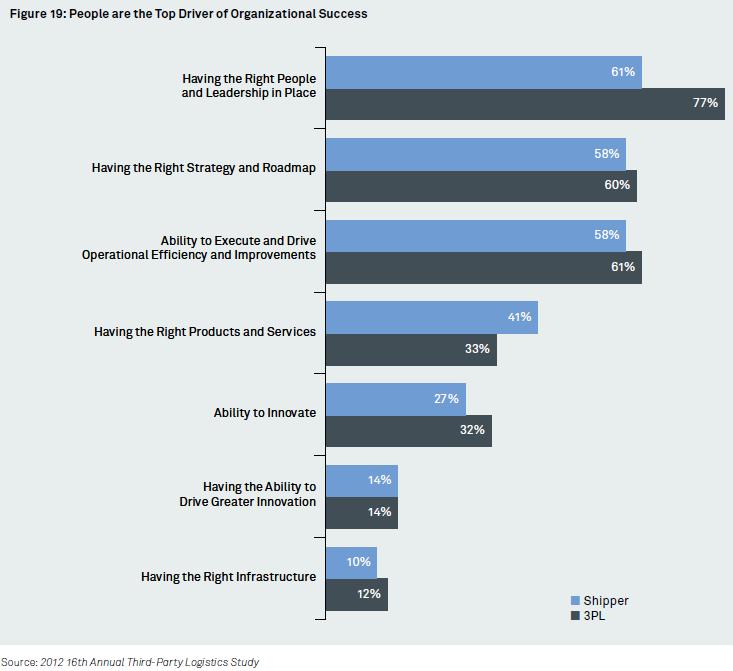
The State of Talent
Talent
management is the vigorous, systematic process of
connecting a clear, well-defined business strategy
to the recruitment, retention and development of
talent.
At times, talent management is an overused term
and an underutilized discipline – particularly
in the logistics industry. Too often, senior management
turns to talent management in crisis mode, when
a key logistics employee has given notice and they
dust off that musty, dated talent management manual
sitting up high on the bookshelf. Development may
consist of an annual performance review that gets
filed away in a drawer.
The experience of one manufacturer is typical of the industry: many executives on its supply chain team boast more than 20 years at the company. That speaks volumes about its attractiveness as a workplace. But the company lacks a robust talent development process; as those supply chain executives reach retirement age, the depth of executives on the bench may be limited.
Many progressive companies leading their industries focus on effective execution of total management principles. Talent management becomes a strategic tool integrated into a company’s business practices and a part of every business manager’s responsibilities. Talent is tied to business strategy, so that if, for example, the company was moving into an emerging market, or entering new trade lanes, the need for talent would be a part of that strategic discussion.
At Kraft Foods, for example, ‘‘Supply chain executives are part of day-to-day management, an integral part of the business planning roundtable and are partnering with other key functional business leaders on the board,” says Mauricio Ferreira, Latin America Supply Chain Director. At one large pharmaceutical manufacturer, recognition of the significant impact of supply chain has elevated its importance in the executive suite. ‘‘Supply chain has been waiting outside the board room for some time, but it’s getting recognition now,” says its VP Logistics, who sits on the company’s Global Risk Management board. ‘‘The eruption of the volcanoes in Europe brought this to the table and made it front of mind that disruptions can occur.”
Talent can be a critical differentiator for 3PLs. With many of their services under threat of becoming commoditized on price, superior talent becomes a competitive advantage. Only those organizations with the very best people in place deliver the innovation and standout service that will set that company apart.
Logistics and the Talent Cycle
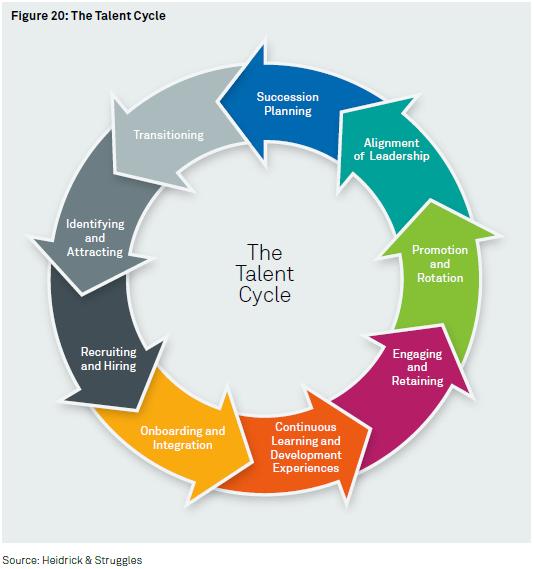
The Talent Cycle in Figure 20 captures the complete lifecycle of an employee’s experience, not just the initial recruitment, but all of the activities that occur to develop that person through the end of his career. The survey results suggest that many shippers and 3PLs are troubled by the current state of talent management within their organizations and see an opportunity to improve it.
Identifying
and Attracting_ skilled talent starts
with creating a workforce strategy to align with
your business strategy, then devising ways to
discover and communicate what your company has
to offer to attract a diverse and talented workforce.
This part of the talent cycle presents tremendous
opportunity and high risk. Risk is highest during
the first 60 days of transitioning a leader into
a new role either from inside or outside.
Recruiting and Hiring_ entails devising strategies for understanding talent needs and sources, executing business/talent plans, establishing interviewing methods and skills and managing the talent acquisition investment. Often in the logistics industry, hiring occurs through word of mouth or hiring from within; as seen in Figure 21, 39% of shippers and 37% of 3PLs are concerned or significantly concerned that their company could do more to increase diverse external perspectives, such as hiring from other industries (talent recruitment).
Onboarding and Integration processes apply to the period just before and after an employee is hired, including planning and supporting transitions and deploying people in the right teams and leadership roles.
Continuous Learning and Development Experiences occur through formal and informal training as well as experience and relationship-based learning and coaching, follow-through, and support. Shippers and 3PLs report similar experiences within their organizations; 36% of shippers and 37% of 3PLs say that their companies’ lack of a meaningful and objective process of measuring performance and issuing consequent actions, such as coaching, is a concern or a significant concern (talent review process). In addition, 41% of shippers and 36% of 3PLs are concerned or significantly concerned that their organization has a number of stars, but their culture/history has not encouraged them to work collaboratively as a team (team effectiveness).
Engaging and Retaining employees’ interest in a shipper or 3PL as an employer requires active communication and performance and career management exercises. Companies need to encourage and enable a work/life balance and ensure recognition and rewards along the way. A substantial 43% of shippers and 40% of 3PLs say the struggle with keeping their strongest talent in the organization is a concern or a significant concern (retention).
Promotion and Rotation means creating a talent development process with clearly defined promotion and rotation criteria and a system for assessment, feedback, and coaching. The top concern of both shippers and 3PLs regarding talent management is the lack of a robust system of preparing rising leaders for the future, such as through job rotations, training and mentoring. (53% of shippers and 54% of 3PLs are concerned or significantly concerned about talent development)
When one telecom company outsourced logistics ten years ago, it lost a lot of experienced supply chain talent. So when the company later began to insource some logistics functions, it instituted a system to identify and map potential logistics leaders, ensuring a balance of gender and ages, and established training programs to develop their expertise.
Alignment of Leadership is all about identifying and developing candidates with high potential, including leadership development and coaching. This is the third-biggest talent management concern for shippers (47%), and second-biggest for 3PLs (48%). These respondents are concerned or significantly concerned that the capabilities of current leaders are not aligned with what is necessary to address future strategic challenges (skills and experience).
Succession Planning requires defining roles and needs, creating evaluation criteria and then developing, supporting and coaching successors. Another top-three concern for both shippers and 3PLs (48% of shippers and 47% of 3PLs) is that their leadership does not take an active interest in understanding the pipeline of good people in the organization and ensuring there is a robust succession planning process in place.
Transitioning means enabling smooth career transitions and staying connected with alumni and retired employees.
Organizations that embrace the activities of the talent cycle have the opportunity to ensure a continuous supply of experienced, well-rounded logistics talent.
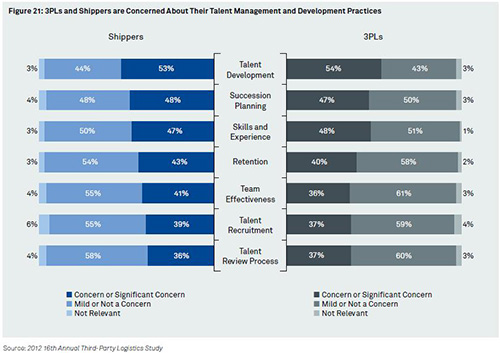
Grooming Leaders
As supply chains grow more complex and intrinsic to a company’s ability to attain its business goals, they require leaders who are more diverse and multi-faceted.
Unfortunately, as seen previously in Figure 21, a significant number of shippers and 3PLs feel their current leaders don’t have what it takes to address future business challenges. Developing leaders requires devoting considerable effort and resources into defining and delivering training in a broad range of competencies.
Organizations differ in the skills and attributes they see as essential in supply chain leadership. As seen in Figure 22, both shippers and 3PLs place the highest value on operational execution in their functional or business leaders – not surprising since many supply chain executives have come up through the operations ranks.
Surprisingly, for both shippers and 3PLs this is followed by leaders’ people management and development skills. People are indeed essential to logistics; the importance of the daily decisions people make, as well as relationships among the people at both the 3PL and the shipper, cannot be underestimated. But given respondents’ assessment in Figure 21 of the current state of talent management in their firms, it’s clear many executives are not backing up this belief in people management with real structure and resources.
While shippers and 3PLs agree on these top two capabilities they value in a leader, after that the difference between a business where logistics is the core competency and one where logistics supports the core competency becomes evident: 3PLs rank a leader’s ability to drive growth as a strong third, while shippers feel it is about equal to strategic planning.
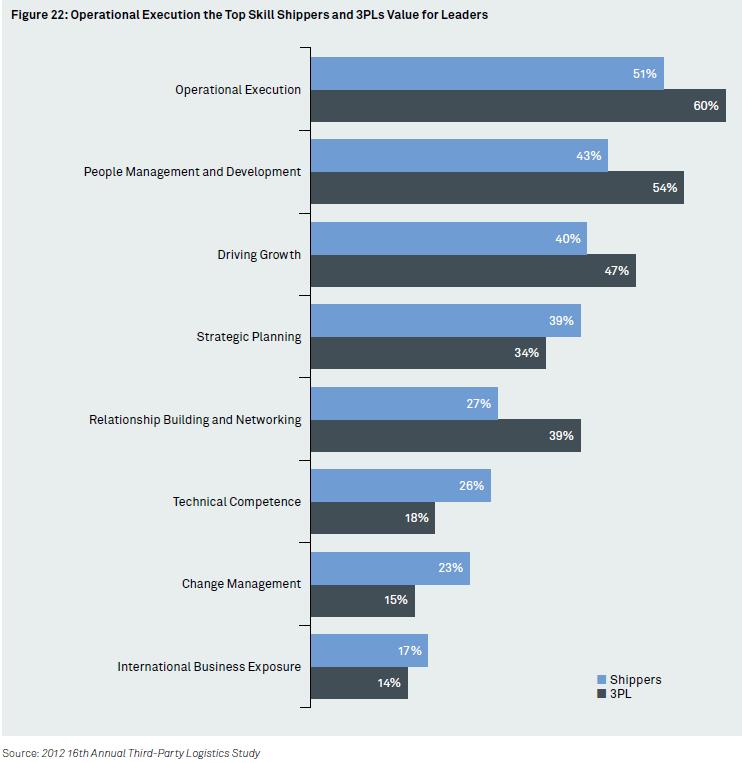
Opportunities for Tomorrow
Today’s supply chain leaders have been required to grow well beyond their operations backgrounds, developing a broad range of competencies including managing sophisticated technology, undertaking competitive and financial analysis and managing people in multiple locations, as well as dealing with flat growth, emerging market expansion and merger and acquisition activity. In many organizations, top logistics officers acquired these additional skills on the job and are clearly skilled at acquiring new competencies. Despite this, Figure 23 confirms that shippers and 3PLs are concerned about the learning agility of their leaders.
Tomorrow’s leaders will need to come into the job with an even broader set of capabilities. Figure 23 also reveals that while the largest percentage of shippers and 3PLs feel their leaders possess solid skills today, and feel their current leaders possess the required skills in relatively equal measure, they are concerned about those abilities long term. While current leaders were learning on the job, few organizations were indoctrinating these new competencies into mid-management training and development. When the time comes for this cohort of managers to move up, the gap between the demands of the job and the skills of the available workforce will be even larger.
‘‘Often we adopt a strategy that if it’s not broken don’t touch it,” admits the VP Operations at a large software and peripherals developer. ‘‘This sometimes leads to a scenario where investment in recruiting new supply chain talent is overlooked.”
In addition, many logistics companies ceased their involvement in supply chain graduate and apprentice programs in the mid-1990s. Today they are experiencing the effects of turning off the pipeline more than a decade ago.
Of course, depth of expertise remains important to fulfill mid-level positions. ‘‘There is a strong need for specialists as well because there are so many best practices/ changes happening in the industry, which one can turn into opportunities for the company,” says Arun Salvi, Logistics Manager Asia Pacific for Shell Lubricants.
Close behind learning agility as a solid competency in today’s supply chain leaders are their ability to execute, deduce and lead visionary change and organization buy-in, although shippers and 3PLs differ somewhat in their rankings of the importance of these abilities. Also notable is the percentage of companies developing experienced technical leaders, but struggling with leader competencies.
‘‘At Emerson Electric, highly valued logistics leader qualities include rich experience in supply chain functions, willingness to drive change, and a long tenure of service at Emerson, so that the leader is familiar with people throughout the company’s complex corporate and divisional organization,” says Tony Xia, Senior Logistics Manager at Emerson Electric. The company rotates its candidates through different areas of responsibility to season them and give breadth of experience.
One telecom company defies the trend toward overlooking leadership development; the company maintains three separate leadership training programs, each emphasizing the following capabilities over five different aspects of leadership:
- Customer understanding
- Execution
- Strategic thinking
- Innovation
- Bringing the best out of everyone
- Breaking down complexity
- Mobilizing teams
- Adaptability
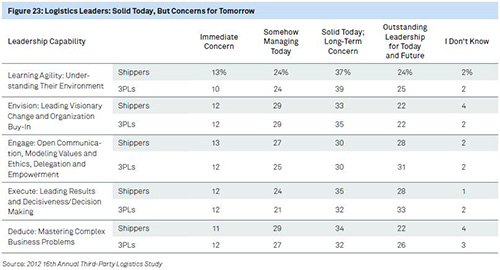
In Search of…
The scarcity of supply chain talent presents a real challenge for many shippers and 3PLs. To date, the majority of both shippers and 3PLs recruit from inside their own industries – 64% of shippers, and 71% of 3PLs, as seen in Figure 24. But 3PLs are more likely than shippers (41% versus 37%) to look outside their own industries. Companies with private equity investment tend to be more likely to take this tack than others. Both shippers and 3PLs may be forced to begin searching in adjacent industries as the talent pipeline continues to dry up.
When one third-party logistics provider sought to infuse top talent into its global leadership team, the company conducted an external search to discover candidates at industries with similar dynamics, including:
- Business-to-business outsourcing services
- Businesses with large numbers of people working at multiple sites
- Industries with some kind of route-based transportation network
- Warehouses and light manufacturing plants, such as contract manufacturers
Shippers and 3PLs favor recommendations by colleagues/word of mouth as their number one talent recruitment strategy (51% of shippers, 63% of 3PLs), and are equally likely to use head hunters (46% and 47%). Social networks are used by a surprising 21% of 3PLs and 22% of shippers for recruitment
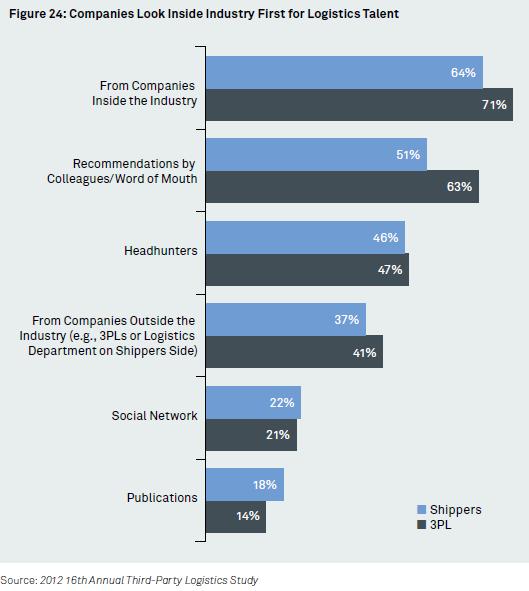
Attracting Talent
Enticing the best candidates is far easier when the company searching is a great place to work. Shippers and 3PLs differ marginally in ranking the top qualities of an attractive workplace, but as seen in Figure 25 company success and performance, attractive salary and benefits and personal development opportunities within the company are top-three for both. ‘‘Attractive remuneration packages and clear career paths are important,” agreed an executive at a telecom company.
People want to work at one large computer manufacturer, for example, because it’s ‘‘constantly changing,” says its Supply Chain Director. ‘‘It’s a fast-moving company and there is always a challenge. We are constantly reinventing and reassessing how we do supply chain and systems.”
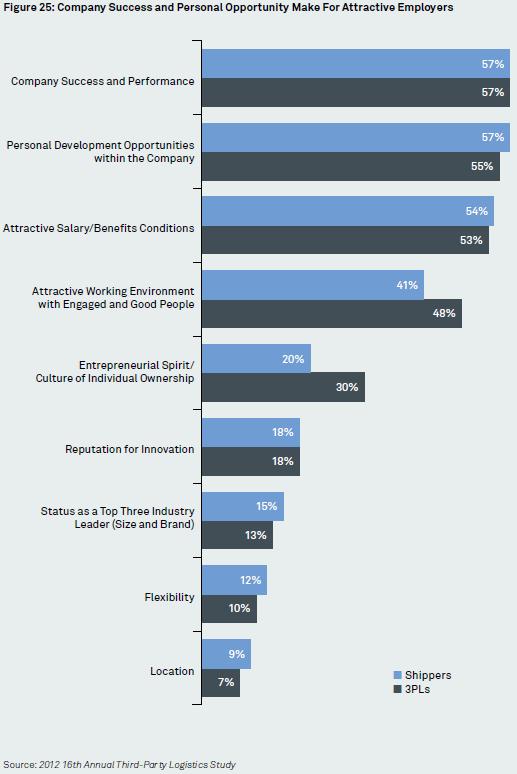
|
Index:
About Capgemini Consulting
With more than 115,000 people in 40
countries, Capgemini is one of the world’s
foremost providers of consulting, technology
and outsourcing services. The Group reported
2010 global revenues of EUR 8.7 billion.
Together with its clients, Capgemini creates
and delivers business and technology solutions
that fit their needs and drive the results
they want. A deeply multicultural organization,
Capgemini has developed its own way of
working, the Collaborative Business ExperienceTM,
and draws on Rightshore®, its worldwide
delivery model.
Capgemini Consulting is the Global Strategy
and Transformation Consulting brand of
the Capgemini Group, specializing in advising
and supporting organizations in transforming
their business, from the development of
innovative strategy through to execution,
with a consistent focus on sustainable
results. Capgemini Consulting proposes
to leading companies and governments a
fresh approach which uses innovative methods,
technology and the talents of over 3,600
consultants worldwide.
For more information: http://www.capgemini-consulting.com/

